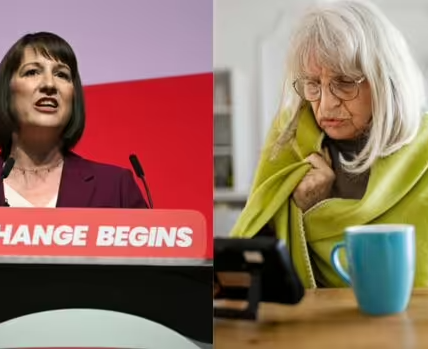EXCLUSIVE: Arundel residents have been left infuriated as they continue to battle endless delays every day.

Charlie Betts is adamant that the road “shouldn’t have been cancelled” (Image: Jonathan Buckmaster)
Locals have been left exasperated after plans for a game-changing dual carriageway have been scrapped by Labour.
The Arundel Bypass would have taken the strain off a rural A-road that suffers from 150% capacity – but it was scrapped by Rachel Reeves in July in a move locals describe as “ridiculous” and “a tragedy”. Now, residents have complained that keeping the road as it is means it takes nearly an hour to travel the short distance around the town.
Arundel is a pretty market town in the South Downs of West Sussex and, at first glance, is the picture of an English idyll, with cobblestone streets, beautiful listed architecture and one of the oldest castles in the country.
Dig a little deeper, though, and it’s a hotbed of local resentment over a decades-old, pervasive traffic problem, with the A27, which cuts the town in two, turning 10 minute journeys into 50-minute treks and discouraging tourists from visiting.
National Highways unveiled plans for the eight-kilometre Arundel Bypass in 2020 – a dual carriageway winding around the town, improving on the “poor safety record and accident rate” of the existing single-lane stretch.
But the project, which has the bulk of local support behind it, was among the first infrastructure projects to be axed by the Labour government in July.
Rachel Reeves said the new road, which was initially estimated to cost £320 million but was recently revealed to be upwards of £600 million, was “unaffordable” and a “poor value for money” and Labour pledged in its manifesto to spend the reallocated funds on “fixing one million potholes across England in the first year of Parliament”.

Matthew Vann and Mike White think the project’s cancellation was “an absolute tragedy” (Image: Jonathan Buckmaster)

Arundel is a pretty market town known for having one of the oldest castles in the UK (Image: Jonathan Buckmaster)
Mike White, 31, who works at Arundel Butchers and lives just outside the town, said the decision was “ridiculous”, describing congestion on the A27 through the South Downs as “not a new problem, but one that’s definitely getting worse”.
“They’re building more houses and people are living longer and driving for longer as a result,” he told Express.co.uk. “Something has to be done. I finish work at 5pm on a Saturday, and I never get out before 5:50pm.”
Matthew Vann, 51, who also works at the butchers, added: “It’s an absolute tragedy. It should have gone ahead years ago. The traffic puts people off visiting and the pollution’s awful too. It’s stifling businesses and it’s stifling the town.”
The bypass route chosen by National Highways would have passed through a cluster of West Sussex villages including Tortington and Binsted, whose residents have been vocal against the plans, which they say would harm the countryside and increase dangerous congestion.
Almost everyone in the area is in favour of a bypass in some form, however, according to Reform councillor for Arundel and Courtwick, Gary Markwell, who had favoured a route not chosen by National Highways because of its incursion on ancient woodland.
Mr Markwell, who defected from the Conservatives

Gary Markwell favoured a different route for the bypass – but thinks the scheme should go ahead (Image: Jonathan Buckmaster)

Drivers dodging traffic on the A27 instead choose “rat-runs” on rural roads (Image: Jonathan Buckmaster)
Local frustration has also centred on the spiralling costs of the project, as noted by Reform councillor for Fontwell, Trevor Bence, who said he “absolutely sees the benefit of a dual carriageway” but thinks upwards of £600 million is far too excessive a cost for “the first stab at getting [the whole of the A27] sorted out”.
“How on earth did it rise by £4 million in three-and-a-half years? I haven’t met anyone who isn’t worried about the impact on Arundel, but this is a whole road problem.”
Meanwhile, Conservative MP for Arundel and South Downs, Andrew Griffiths, was focused on the significant local infrastructure provision the road would have offered. suggesting it was a “sick joke” for Labour to reject the plans shortly before increasing housing targets to 20,000 in the south east.
“The cancellation of the A27 bypass was one of the very first acts of this Labour government,” he said. “[It] would have relieved thousands of residents who are impacted by congestion and rat-running across the South Downs and we’ve [now] learned that the area is expected to take thousands of new homes.
“Labour talk big on infrastructure, but their actions speak louder than words.”
It’s a frustration that translates to the local level. Charlie Betts, 78, a former carpenter and joiner who lives in Rustington but has worked in Arundel all his life, is adamant that the scheme “shouldn’t have been cancelled”.
“In the summer, you can’t move for traffic,” he told the Express. “It’s been a problem for as long as I can remember – it used to get bottlenecked in the ‘60s.”
Mr Betts said a temporary relief road, built in the 1970s to redirect traffic from the town centre, took the pressure off the main High Street, but with congestion “getting heavier and heavier”, the need for more local infrastructure has continued to rise.

The proposed Arundel Bypass route, chosen by National Highways (Image: National Highways)
The Arundel Bypass would split from the current A27 to the south of Arundel, circumvent the single carriageway currently running through the town, before reconnecting with the existing A-road before it enters Worthing in the east.
Suzanne Wheeler, 52, who lives in nearby Climping and runs Partners Cafe in Arundel, thinks National Highways needed to think on an even bigger scale – acknowledging the breadth of the congestion stretching beyond the town and into Worthing as well as on the A27 to Chichester in the west.
“It’s something they’ve always talked about, and traffic is a nightmare when people cut through the town, especially between 4pm and 6pm. They’ve been trying to do something about it since I was little – it just seems like it’s always in the works.”
Belinda Wilkins, 72, who lives in Worthing but travels through Arundel for work, is inclined to agree, but thinks the strength of local feeling is behind a bypass in some form.
“I don’t know if the route that was going to be taken was the right one – but I’m very keen for something to be done. Build-up from the A27 through Arundel also causes traffic in the villages around it, because people rat-run through them as shortcuts.
“We moved here 45 years ago, and it’s been slow progress. I would have thought there’s a cheaper route that doesn’t pass through the villages and is at a price the country can afford.”

Suzanne Wheeler says traffic can be “a nightmare” in the town (Image: Jonathan Buckmaster)

Belinda Wilkins thinks local people are behind a bypass in some form (Image: Jonathan Buckmaster)
Kim Finch, 62, who owns the Moathouse Bakeaway Cafe in the town centre, commutes in from Chichester and also says something should be done to alleviate the problem – but that she “can’t ever see it happening now”.
“I’d be shocked if they ended up building it. I have to leave very early in the morning to get in on time and the traffic down to the roundabout is terrible after 4:30pm most days. There was a lot of hope that this road would happen, but the expense of it just seems too high.”
The project didn’t come out of nowhere at the beginning of the decade. Debate over how to circumvent traffic through Arundel has raged for more than three decades, with very little in the way of physical progress – despite the proposed stretch only spanning four miles.
After the temporary relief road was built in the 1970s, keeping heavy traffic out of the town centre, plans were commenced to link the sections of dual carriageway on either side of the town through a bypass.
The proposals remained in project stage, however, before falling foul of then Transport Secretary Alistair Darling for its potential “consequences on the local environment” in 2003.
It was picked up again by the Tory government of 2015, with a Highways England survey held in 2017 showing 79% local agreement that the new bypass was a necessary infrastructure scheme.
Before it was scrapped by Labour in July, the development had been pushed back to 2025 by the Tory government. Ms Reeves said the Conservatives had known the project wasn’t affordable and grouped it with “nearly £800 million of unfunded transport projects that have been committed to next year”, adding: “If we cannot afford it, we won’t do it.”
A spokesperson for the Department for Transport said: “We are committed to boosting infrastructure and growth across the country, investing in projects that drive growth and opportunity while delivering value for money for taxpayers.
“The A27 Arundel bypass was cancelled because it represented low value for money and received strong local opposition.”


